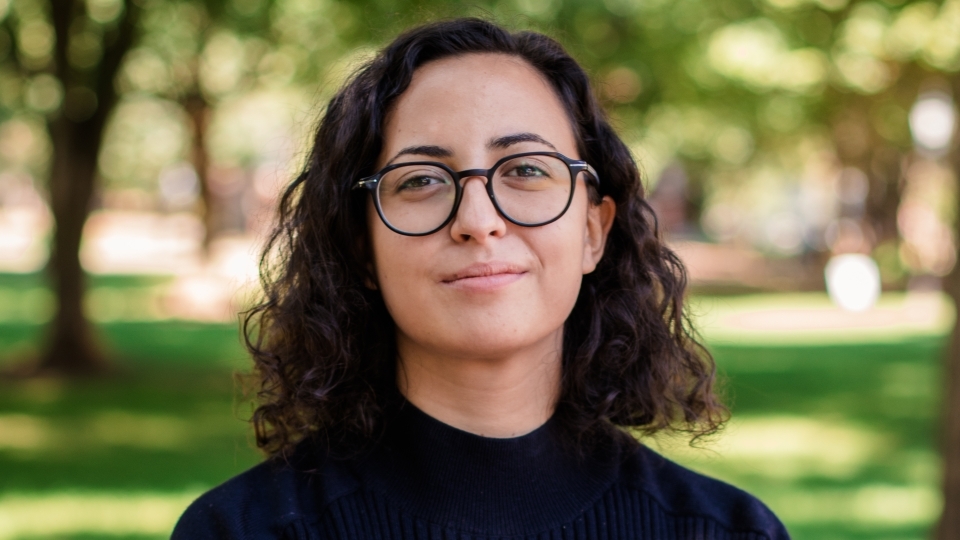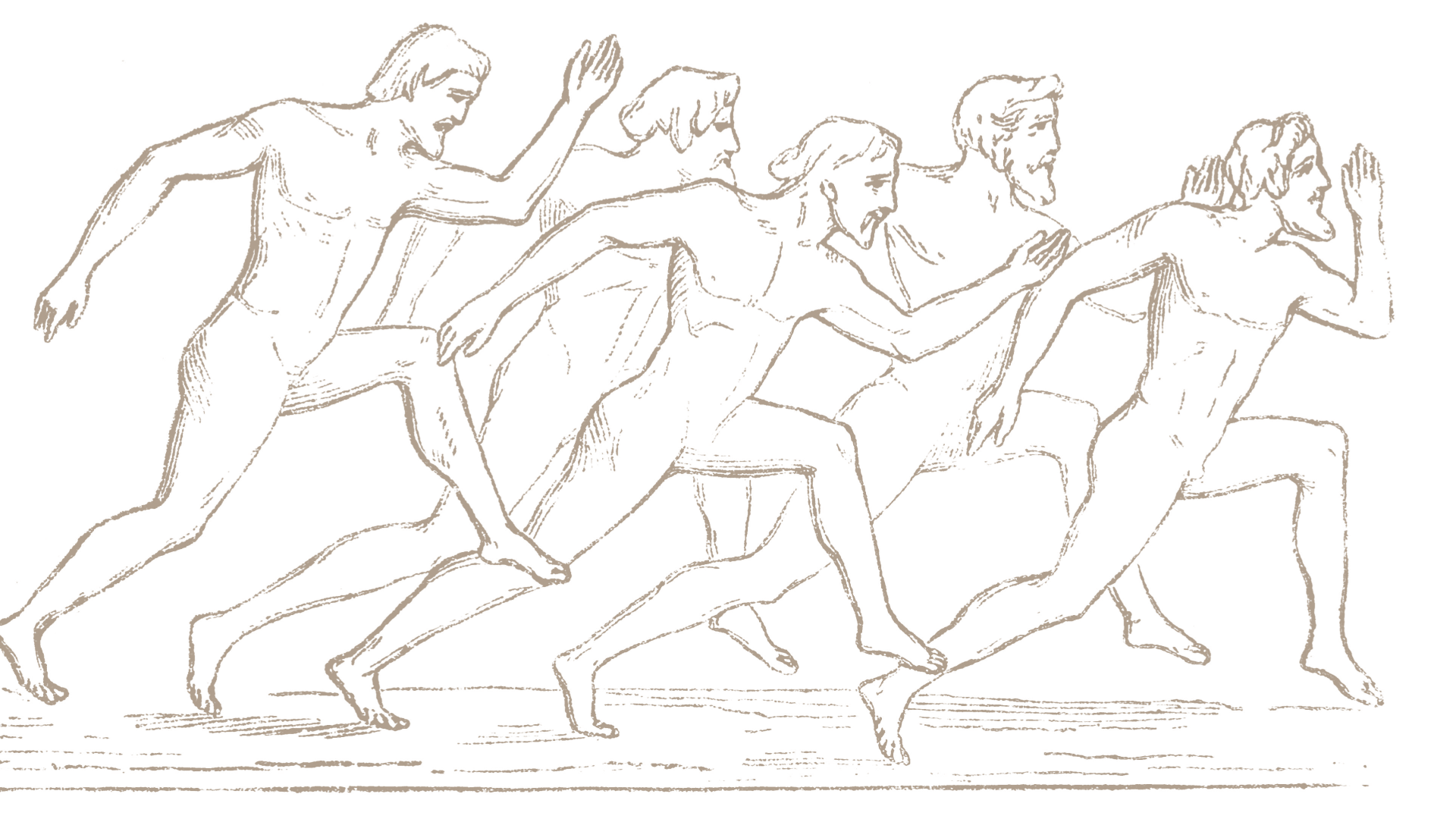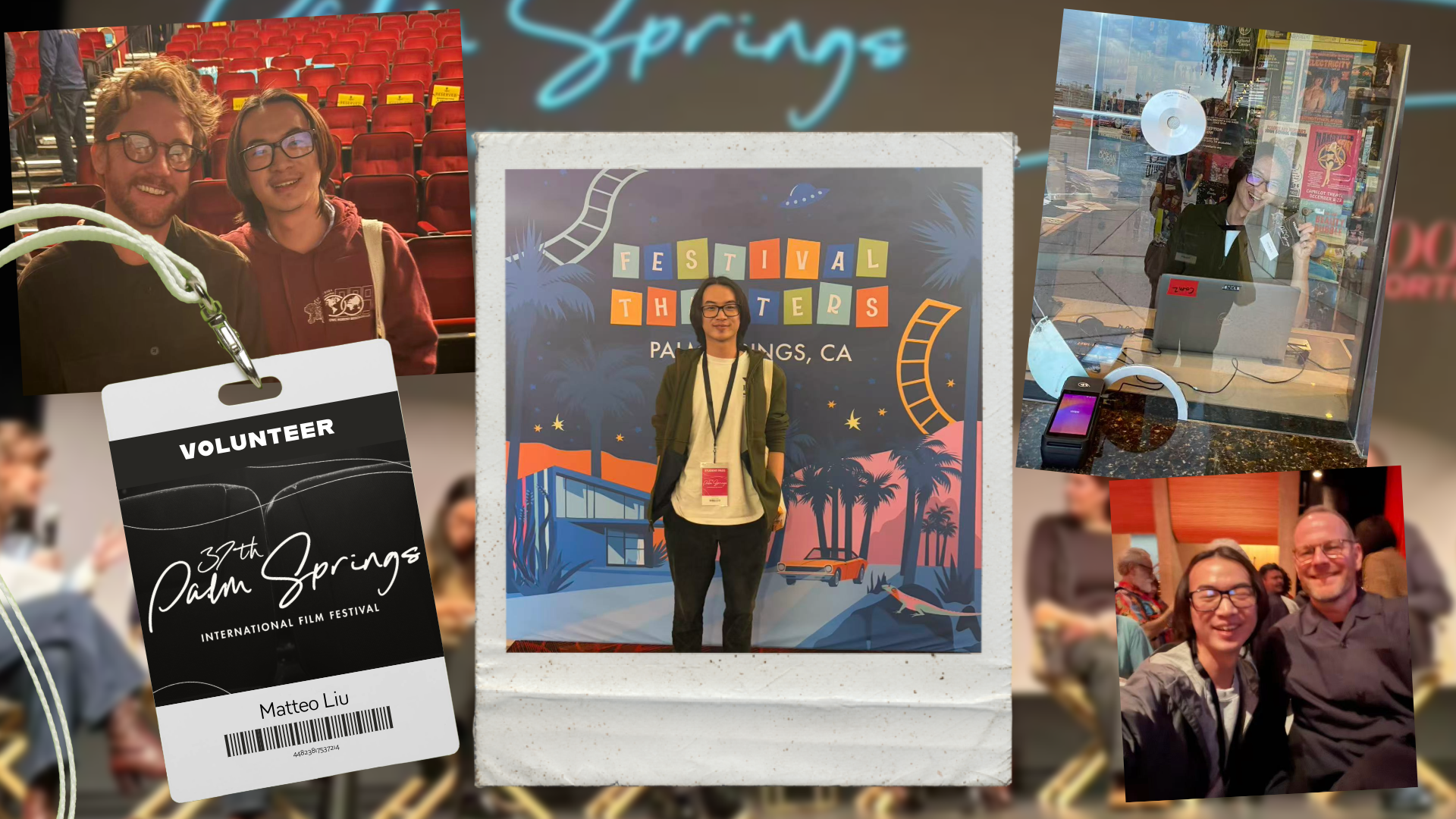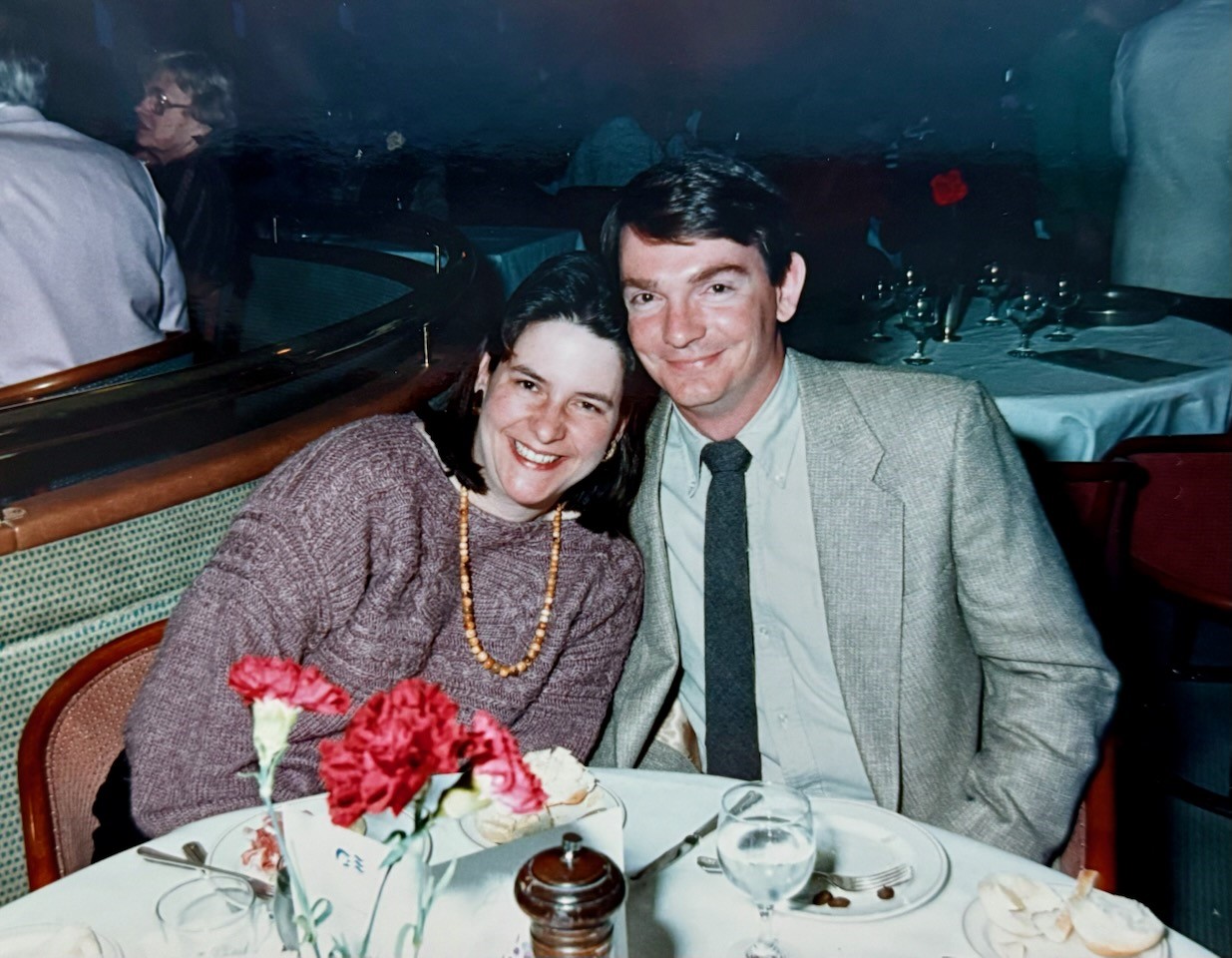Oxford-bound Smith Scholar Seeks to Understand, Overcome Differences in a Fragmented World
July 16, 2021
- Author
- Mary Elizabeth DeAngelis

Davidson's 2021 Smith Scholar Dahlia Krutkovich plans to attend the University of Oxford this fall. The W. Thomas Smith Scholarship is a top award that recognizes outstanding academic achievement, leadership, and community service.
Dahlia Krutkovich likes to talk to people who think she’s wrong.
“I’m open to and really eager to understand people who disagree with me,” she says. “Even if I think their arguments are flawed or silly or even harmful, I want to give them a fair shake rather than just dismissing them.”
That’s a principle Krutkovich ’21 takes away from her time at Davidson College. It guided her as she moved from her predominately Jewish community in New York to the small Presbyterian college in the South. And it’s one she’ll carry on her journey to explore how people from different races, ethnicities and beliefs can live peacefully among each other in a divided world.
She thinks very deeply and critically, and carefully. She seeks to understand issues and ideas rather than making assumptions or jumping to conclusions about things. She wants to be well informed.
Her professors describe a sophisticated, gracious, insightful intellectual who constantly challenges herself to learn more so that she can tackle society’s injustices.
“Intellectually, whenever I met with Dahlia, I knew I had to up my game,” says Caroline Fache, professor of French and Francophone Studies at Davidson. “I’d do my readings before I met with her, and she’d still ask questions I didn’t have easy answers for—I learned along with her.
“She has such a desire to learn, and she does that with this beautiful sense of humility and humaneness—and a commitment to make the world a better place for everyone. It was a treat to mentor her; I was honored to have that special relationship,” Fache says. “She’s going to be something—watch where she’s going.”
For now, she’s headed to England. The Global Literary Theory major from the Bronx plans to attend the University of Oxford this fall. She’ll pursue her studies as Davidson’s 2021 Smith Scholar, a top award that recognizes outstanding academic achievement, leadership, and community service.
The W. Thomas Smith Scholarship is designed to be similar to other prestigious postgraduate awards, such as the Rhodes Scholarship and Fulbright U.S. Student Program, and pays for a graduating student to pursue a year of graduate study at a university abroad. Krutkovich plans to get a master’s in Jewish Studies with a focus on post-Holocaust France. She wants a deeper understanding of how Jewish and non-Jewish cultural figures viewed the genocide from sociological and theological perspectives. She’ll explore that in the modern context of how France, where she studied during her third year of college, has evolved culturally and politically alongside its increasingly diverse population.
“What is acceptable in the mainstream French cultural conversation is a lot different from the U.S. They’ve not figured out how to talk about cultural diversity and difference,” Krutkovich says. “In France, it’s considered racist to talk about race or ethnicity. Regardless of that norm, or possibly because of it, tensions still exist, and you see it become more prominent, historically, as more people emigrate from other places.
“My study of France leads me back to understanding how we can all live together,” she says. “That’s the broader theme of my academic career. How do you live together if you can’t articulate difference? How do you find commonality? I do that primarily using Jewish identity as a lens.”
A Quest to Learn Differing Worldviews
Krutkovich’s dad, Arkady, was 11 when his family settled in Brooklyn’s Brighton Beach community in 1980 as refugees from the Soviet Union. Her mom, Sumantha Sen, grew up in India with a British mother and an Indian Hindu father and immigrated to the U.S. at 17. (Krutkovich says her mom didn’t know her own mother’s family was Jewish until just before that move. After living through World War II in Europe, Krutkovich’s grandmother had kept her religious upbringing under wraps.)
Sen is a clinical social worker studying for a Ph.D. Arkady Krutkovich is a software engineer. Dahlia’s younger sister Maya is finishing a gap year before heading to college in the fall.
Dahlia Krutkovich says her parents always stressed education as the means to a better understanding of a complex world. When Davidson offered her a prestigious Belk Scholarship, she accepted, and entered a new world.
“I grew up with a whole lot of kids from Russian-Jewish families. Whenever I went to my grandparents’ house, Russian was spoken at the table,” she says. “When I got to Davidson, it felt pretty different. I didn’t find many people who had Russian-speaking Jewish grandparents. But there were a lot of Christians who took their faith seriously and didn’t have a clear understanding of Judaism independent of Christianity. We had a lot to learn from each other.”
Part of that involved joining the college’s interfaith dinner club, where first-year students with a variety of religious and spiritual traditions get together to share differing perspectives.
“She’s very thoughtful, she always asked really good questions,” said Davidson Chaplain Rob Spach '84, who convened the group. “She also began to emerge that year as a leader of the Jewish community on campus.”
During fall of her second year, a gunman murdered 11 people at The Tree of Life synagogue in Pittsburgh. Krutkovich led a campus vigil for the victims. Less than two weeks after the shooting, a doxing outed two Davidson students for Neo-Nazi postings on social media. Those students left the college; the incident left the college community shaken.
In the aftermath, Krutkovich led an effort to give Jewish studies more prominence. She and seven other students launched an oral and written history research project to tell the stories of Judaism at Davidson. They found some of the history troubling, including a professor whose 1977 job offer was rescinded because he was Jewish at a time when a college bylaw allowed only Christians to hold tenured professorships. Student and faculty protests followed, and the college dropped that bylaw in 1978.
More recently, trustees invited Krutkovich to be a panelist for a virtual event providing student, faculty, and staff assessments on proposed changes to the bylaws. One was a requirement (which no longer exists) that the college president affiliate with and attend Davidson College Presbyterian Church while in that role.
Krutkovich thought the bylaw seemed contrary to the inclusive culture and values she’d experienced at Davidson. She talked about how it would exclude her and others from diverse religious and spiritual backgrounds from ever seeking to lead the college.
Spach, who served on the panel with her, says she met with him often to learn about the Reformed Presbyterian tradition and specifically how it pertains to education at a liberal arts college.
“She spoke very respectfully about the Presbyterianism of the college, and she also spoke about her personal experience as a Jewish student at Davidson and what it was like for her when she learned about the bylaw,” Spach says. “She thinks very deeply and critically, and carefully. She seeks to understand issues and ideas rather than making assumptions or jumping to conclusions about things. She wants to be well informed."
“She has a concern with issues of social justice that connect to her Jewish tradition. She puts it into practice through service.”
Surrounded By Humane Influences
Her studies at Davidson have bolstered those ideals.
She says in her Smith Scholarship personal statement that mentor “Dr. Karl Plank instilled in me the value of good reading: Good-faith interpretation will lend itself to mutual language. If you can work out the motivation and language of your interlocutors, there is hope still that you will understand each other. Though he was talking about textual interpretation, I think about our fractured social moment in a similar way.”
She’s razor-sharp, there’s a kind of rare brilliance she has—this ability to move between the theoretical and abstract and into concrete situations.
Whether you’re talking politics, religion, or educational theory, it’s important to seek that understanding, she says, “and after thinking rigorously about an argument, you can dismiss it if you think it’s ill-informed.”
Plank, the James W. Cannon Professor of Religion, says that Krutkovich is a standout among the students he’s taught during nearly 40 years at Davidson.
“She’s razor-sharp, there’s a kind of rare brilliance she has—this ability to move between the theoretical and abstract and into concrete situations,” Plank says. “She has a confidence in her thoughts that enables her to stand firmly but remain sensitive to other views.
“She listens with a great deal of openness before she speaks, and when she does speak, she’s unusually thoughtful and committed to peaceful dialogue. She recognizes patterns with great insight and sees things that others miss,” Plank says. “I’ve always considered her more a peer than a student. When she talks, I take notes.”
Plank and Fache served as her senior thesis advisors.
Fache met Krutkovich as a first-year student taking a highly advanced class, taught in French, about the Second French Colonial Empire. “The incredible complexity of her thinking, as an 18-year-old, was uncanny,” Fache said. “It’s even more uncanny now—as in the most highly advanced graduate level. I couldn’t be any more proud of her and the work she’s done.”
Krutkovich sees many possible options for her future after Oxford. She may pursue a doctorate and an academic life. Or go to law school and on to a career as a human rights lawyer. She has time, and a clear sense of how she’ll approach whatever comes next.
“One of my takeaways from Davidson is working with a sense of good will, under the assumption that people have good intentions,” she says. “We live in such a fragmented world, I find that really rare. The influences I had at Davidson were some of the most generous and humane, from (President) Carol Quillen to Rob Spach to my professors.
“My friends who went to different colleges didn’t seem to have that experience—to leave with the sense that a personal commitment to human decency is the most important thing you bring away from your time in college.”



